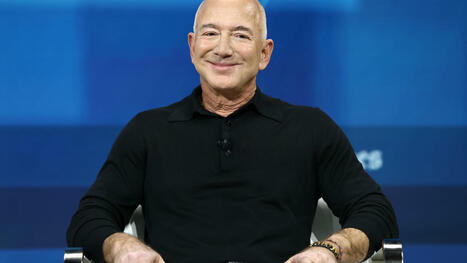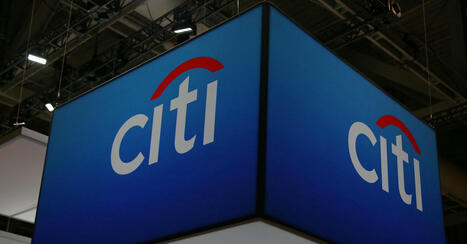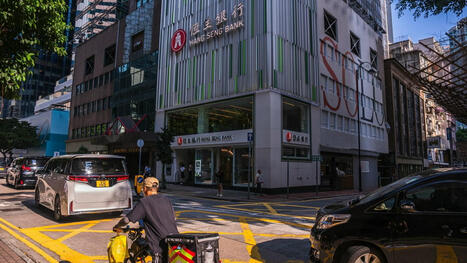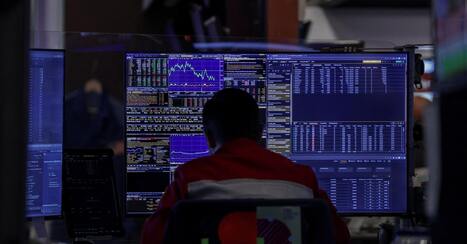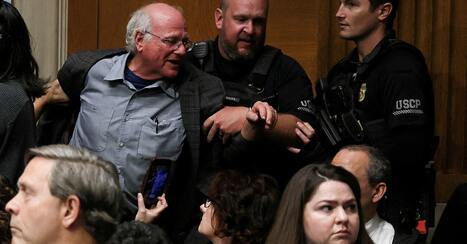 Your new post is loading...
 Your new post is loading...
A major investment research company has warned that US corporates may be losing "useful signals" on sustainability issues after the number of environmental and social (E&S) shareholder resolutions fell significantly this year. Research from Morningstar also shows a yawning gap between US investors and their European counterparts, when comparing support for E&S. Lindsey Stewart, Morningstar's director of investment stewardship, writing for the Harvard Law School governance blog, says that, in the past, the proxy season has provided US markets with clear signals about which sustainability topics are considered most important by fund managers. But that is no longer the case.
Since the start of the year, geopolitical pressures have combined with trade negotiations and deregulation efforts to create heightened volatility for business. And as we begin the fourth quarter of the year, that instability shows little sign of improvement. Business risk is surging, according to legal and compliance leaders surveyed by Corporate Board Member as part of our Q3 Business Risk Index, which is a survey of general counsel, compliance leaders and audit members conducted in partnership with Diligent Institute. Legal and compliance chiefs are rating the level of risk in the current business environment at 7.9 out of 10, on a scale where 1 is Negligible and 10 is Significant. That number has been rising significantly since Q1, when business risk was rated just 5.8 out of 10––an increase of 36 percent since then.
Elon Musk has agreed to settle a $128m (£100m) lawsuit brought by four former top executives at Twitter, now X, over unpaid severance when he took over the company. The executives, who include former CEO Parag Agrawal, argued that Musk fired them "without reason" after he bought Twitter in 2022 and denied them severance payments. "The parties have reached a settlement and the settlement requires certain conditions to be met in the near term," attorneys for the plaintiffs wrote in a court filing last week. They did not disclose the terms of the settlement. The suit, filed last year, is one of several legal challenges over unpaid severance for workers who were laid off after Musk took over. Lawyers for the former Twitter executives, and for Musk and X, did not immediately respond to requests for comment on the settlement. The former top brass - Mr Agrawal, former chief financial officer Ned Segal, former chief legal officer Vijaya Gadde and former general counsel Sean Edgett - contended in their lawsuit that they are owed one year's salary and stock awards, under a years-old severance plan.
Drugmaker Bristol Myers Squibb said on Friday it will acquire privately held cell therapy developer Orbital Therapeutics for $1.5 billion in cash, aiming to diversify from legacy products facing competition from generic drugs.The deal expands Bristol Myers Squibb's CAR T-cell immunotherapy portfolio with Orbital's lead experimental candidate, OTX-201, which is designed to target autoimmune diseases. This marks the company's first major acquisition of the year, as it shifts focus beyond established blockbusters, such as the blood thinner Eliquis and cancer drug Revlimid, to reassure investors that its newer therapies can drive future growth. In March, the company had made a smaller acquisition of its partner 2seventy bio for about $286 million in cash, saving future profit-sharing costs on Abecma, a CAR T-cell therapy for a type of blood cancer called multiple myeloma.
Abecma and blood cancer cell therapy Breyanzi accounted for about 1.7% of Bristol Myers' total revenue last year. CAR T-cell therapies work by collecting white blood cells from a patient, genetically modifying them to fight a cancer and then infusing them back into the patient.
Statistics Canada says the economy added an unexpected 60,000 jobs in September, keeping the unemployment rate steady at 7.1 per cent. Economists had called for a modest gain of 5,000 jobs last month, coming off a drop of more than 100,000 positions over the previous two months. Statistics Canada says the gains were concentrated in full-time work with 106,000 positions added in September, more than offsetting a drop in part-time work. The agency says overall employment is up by 22,000 net jobs since the start of the year as tariffs from the United States continue to put pressure on some critical Canadian sectors. The trade-sensitive manufacturing industry saw its first job gains since January last month and led job growth among other sectors with 28,000 positions added in September. The unemployment rate for youth aged 15 to 24 ticked higher to 14.7 per cent as students returning to school continued to struggle finding work after a tough summer jobs market.
Spain’s FCC has agreed to sell a 25-per-cent stake in its environmental subsidiary FCC Enviro to Canadian pension fund CPP Investments for €1-billion, it said late on Thursday. Following the deal, the construction and infrastructure company FCC, majority-owned by Mexican billionaire Carlos Slim, will retain a 50.01 per cent stake in its subsidiary, while CPP will increase its stake to 49.99 per cent, the company added. In a statement, FCC said it intended to use the proceeds to address strategic opportunities and corporate needs. FCC Enviro and its domestic and international subsidiaries carry out environmental services activities through four main platforms. The transaction is subject to regulatory approvals. In 2023, FCC sold around a quarter of its environmental subsidiary to CPP for €965-million.
Recent fraud convictions, including of two men involved in the multimillion-dollar redevelopment of Toronto’s St. Michael’s Hospital, are seen as a step forward in Canada’s fight against white-collar crime. The guilty verdict against Vas Georgiou, the hospital’s former chief administrative officer, and John Aquino, the former president of Bondfield Construction Co. Ltd., follows another high-profile fraud conviction in Ontario court earlier this year. In May, Jawad Rathore and Vince Petrozza, the co-founders of now-defunct syndicated mortgage company Fortress Real Developments Inc., were found guilty of fraud after a lengthy criminal trial. The sentencing hearing has been set for Dec. 3. Their lawyers have said they plan to appeal. Experts say the pair of convictions demonstrates that Canadian law enforcement, prosecutors and courts have the capacity to tackle complex financial investigations.
Le Groupe Laganière passe à l’offensive en déposant une poursuite de 17,6 millions de dollars contre Montréal-Est. L’entreprise accuse la Ville de l’empêcher de développer le site racheté à Shell et d’en plomber la valeur par le fait même. Dans une demande introductive déposée ce lundi à la Cour supérieure du Québec, le Groupe Laganière accuse Montréal-Est d’avoir adopté en février une résolution qui l’empêche de développer l’immense terrain qu’elle a racheté à Shell. De son côté, la Ville souhaite pouvoir planifier le développement du secteur. Cette résolution a été adoptée en séance extraordinaire, quelques jours après avoir été refusée lors d’un premier vote. En agissant de la sorte, soutient l’entreprise spécialisée dans les services environnementaux, la Ville aurait « sciemment posé des gestes » dans le but de « contrôler l’usage » des activités sur son terrain. Le Groupe Laganière demande maintenant 17,6 millions de dollars en dommages et intérêts ainsi qu’en dommages moraux.
Deal-making may have rebounded on Wall Street, but investment firms of the ultra-wealthy are still moving cautiously. Family offices made 54 direct investments in September, down 46% on an annual basis, according to data provided exclusively to CNBC by private wealth platform Fintrx. Despite the broader slowdown, billionaire family offices are still investing in mega-rounds for high-flying startups. Last month, the firms of Amazon founder Jeff Bezos and former Google CEO Eric Schmidt joined a $300 million seed round for Periodic Labs. Founded by former OpenAI and DeepMind researchers, Periodic Labs seeks to automate scientific research with artificial intelligence-powered robots running lab experiments.
Israel and the Palestinian militant group Hamas signed an agreement on Thursday to cease fire and free Israeli hostages in exchange for Palestinian prisoners, in the first phase of U.S. President Donald Trump’s initiative to end the war in Gaza. Israelis and Palestinians alike rejoiced after the deal was announced, the biggest step yet taken to end two years of war in which over 67,000 Palestinians have been killed, and return the last hostages seized by Hamas in the attacks that unleashed it. Officials on both sides confirmed they had signed the deal following indirect talks in the Egyptian beach resort of Sharm el-Sheikh. Under the deal fighting will cease, Israel will partially withdraw from Gaza and Hamas will free all remaining hostages it captured in the attack that precipitated the war, in exchange for hundreds of prisoners held by Israel.
PepsiCo reported declining sales volumes in its two biggest businesses and announced the departure of its chief financial officer after less than two years, as the food and beverage company engages with activist investor Elliott Management. The maker of Pepsi and Doritos said organic sales volumes fell 4 per cent at both its North American food and beverage businesses in the third quarter, underscoring how higher prices and health concerns were turning away some consumers. Struggles in PepsiCo’s North American businesses have caught the attention of Elliott, which last month disclosed a $4bn stake and offered extensive recommendations for turning the business around. The campaign is intensifying pressure on chief executive Ramon Laguarta to boost sales that have slowed in the past two years. On Thursday, PepsiCo also announced that finance chief Jamie Caulfield would retire next month after less than two years in the job. He will be replaced on November 10 by Steve Schmitt, finance chief at the US division of Walmart, PepsiCo’s largest customer.
Citigroup on Thursday rejected Mexican mining and transport conglomerate Grupo Mexico's bid for its retail unit in the country, known as Banamex, opting instead to push forward with a previously agreed-upon deal. Grupo Mexico surprised last week when it made an unsolicited $9.3 billion offer for Banamex, more than two years after it had backed away from negotiations. The news rocked local markets, wiping off billions in the firm's market capitalization. Shares in Grupo Mexico climbed more than 4.5% on Citi's statement Thursday that it rejected the bid. Citi last month announced that it would sell a 25% stake in Banamex to Mexican billionaire Fernando Chico Pardo, chairman of airport operator ASUR for around $2.3 billion. The lender then planned to hold a public offering for the rest of the unit, it said at the time, while also gauging the interest of other local magnates. Citi on Thursday said that it believed that deal was the best option to divest from Banamex responsibly and maximize value for shareholders.
When Tesla directors offered Elon Musk the biggest executive pay package in corporate history in September, it reassured investors that he would have to achieve the equivalent of “Mars-shot milestones” to earn $878 billion in Tesla stock over 10 years. The board’s proposal said Musk would have to “completely transform Tesla and society as we know it” in robotics and autonomous driving as well as stock value and profits. Conversely, Musk would get “zero” unless he meets those “incredibly ambitious” goals. Yet Musk could reap tens of billions of dollars without meeting most of those targets, according to a Reuters analysis of his performance goals and more than a dozen experts in executive pay, company valuations, robotics and automotive trends including autonomous driving. He could collect more than $50 billion by hitting a handful of the board’s easier goals that won’t necessarily revolutionize Tesla’s products or business, the Reuters review found.
|
In December 2024, when Intel directors lost confidence in CEO Pat Gelsinger’s turnaround strategy—culminating in a $16.6 billion loss and 60 percent stock decline—they exposed a critical governance flaw: lacking sufficient semiconductor expertise to evaluate whether his plans could succeed in an AI-driven market. The knowledge gap became glaringly apparent after seasoned semiconductor executive Lip-Bu Tan resigned in frustration over Intel’s inadequate AI strategy and bloated workforce, only to be appointed CEO in March 2025—a dramatic reversal that underscored that Intel’s struggles stemmed not from operational mistakes alone but also fundamental shortcomings in board composition and oversight. With the business landscape evolving at breakneck speed, as new technologies, regulatory changes and market disruptions emerge faster than ever before, boards must ask: How can we ensure our board composition remains relevant and effective not just today but also for the uncertainties of tomorrow?
HSBC’s takeover of Hang Seng Bank has been 60 years in the making. Chief executive Georges Elhedery wasn’t even born when the bank first took a stake in its Hong Kong-based rival. On Thursday he announced plans to buy full control of Hang Seng for $13.6bn. Investors were spooked by the news; they should instead take a similarly long-term view. The 6 per cent fall in HSBC’s share price after the deal was announced may have a lot to do with how it’s being funded: Elhedery plans to pause share buybacks for the next three financial quarters. Bank investors prize chunky capital returns, and that’s especially true for HSBC. Its army of retail investors like the combination of cash payments and guaranteed earnings per share growth, so it is unsurprising to see a bad initial reaction. But it’s worth remembering that buybacks are generally a signal that companies cannot see anything better to do with the money. That case is much easier to make when their equity looks cheap. When HSBC’s shares were trading at a fraction of book value, repurchases gave a big boost to earnings per share, but since the stock has more than doubled in three years, the calculation has changed.
Nineteen of the World Bank's 25 executive directors issued a joint statement this week affirming their support for the bank's continued work on climate change, defying the U.S., the bank's largest shareholder, and several other countries. The executive directors for the U.S., Russia, Kuwait and Saudi Arabia declined to sign the document; Japan and India - both negotiating trade deals with the U.S. - abstained, a source familiar with the matter said. The directors, who represent 120 countries, issued the statement after a board meeting with World Bank management, underscoring their expectation that the bank will stick to its climate change action plan goals, including a pledge to devote 45% of its annual financing to climate-related projects. The document, a copy of which was viewed by Reuters, reflects the deep divide separating most other countries from the U.S. and a handful of allies over climate change. It comes days before the start of the annual meetings in Washington of the World Bank and International Monetary Fund.
Global financial regulators have laid out plans for closer monitoring of artificial intelligence risks as banks and other parts of the financial industry ramp up the use of AI. Banks have been broadly optimistic that AI will make them more productive, but regulators around the world have expressed concerns about its potential impact on financial stability. The G20’s risk watchdog, the Financial Stability Board, said in a report on Friday that if too many institutions end up using the same AI models and specialized hardware, this could lead to herd-like behavior. “This heavy reliance can create vulnerabilities if there are few alternatives available,” the board said. A separate study published by the central bank umbrella group, the Bank for International Settlements, added there was an “urgent need” for central banks, financial regulators and supervisory authorities to “raise their game” in relation to AI. “There is a need to upgrade their capabilities both as informed observers of the effects of technological advancements and as users of the technology itself,” the BIS said.
China has launched an antitrust investigation into U.S. semiconductor manufacturer Qualcomm over its acquisition of Israel’s Autotalks, China’s market regulator said on Friday. China’s State Administration for Market Regulation said the probe would look at whether Qualcomm violated China’s antitrust law by not lawfully declaring some details in its acquisition of the Israeli chip designer. Qualcomm’s shares were down 2.8 per cent in premarket trading. San Diego-based Qualcomm said in June it had finalized the deal for Autotalks, which makes communications chips to help prevent car crashes, without disclosing the size, or how it had resolved earlier sticking points. Qualcomm had said in 2024 it would drop the bid for Autotalks after it failed to get regulatory approvals in a timely manner. Qualcomm did not immediately respond to a request for comment on the Chinese probe. In 2015, the major supplier of mobile phone chips paid a US$975-million fine to resolve a Chinese antitrust case.
Linamar Corp. says it’s expanding its U.S. manufacturing footprint though a US$300-million deal to buy select North American assets of Aludyne Inc. Guelph, Ont.-based Linamar says the Aludyne portfolio adds capabilities in aluminum casting, precision machining and product design that are complementary to its existing structures and chassis business. The auto parts manufacturer says adding the U.S.-based assets will better help it support customers locally in today’s “dynamic global trade environment.” The deal comes as Canada’s auto sector faces a variety of U.S. tariffs aimed at shifting more manufacturing into the country. Linamar chief executive Jim Jarrell says in a statement that the deal reinforces supply chain stability for its customers. Linamar is a diversified manufacturer with 34,000 employees that along with its automotive business also produces farm and industrial equipment across its 75 production locations.
La Chine a annoncé vendredi qu’elle allait imposer des droits « spéciaux » aux bateaux américains dans ses ports, en représailles à des mesures similaires annoncées en avril par les États-Unis. Ces droits s’appliqueront à partir de mardi prochain aux bateaux propriétés d’entreprises américaines, à ceux affrétés par des entreprises américaines et à ceux construits aux États-Unis, a indiqué le ministère des Transports dans un communiqué. Ces navires arrivant en Chine devront s’acquitter d’un montant de 400 yuans (78 dollars canadiens) par tonne nette. Le tarif passera à 640 yuans (126 dollars canadiens) en avril prochain, avant d’augmenter chaque année. Ces « redevances portuaires spéciales » s’appliqueront à chaque voyage effectué vers la Chine, et non à chaque escale si le bâtiment en fait plusieurs en Chine, sans dépasser cinq impositions par an, a précisé le ministère des Transports. Cette mesure entrera en vigueur le même jour que celle, similaire, décidée par les autorités américaines. Ces dernières vont prélever des frais sur les navires construits ou exploités par des entreprises chinoises accostant aux États-Unis.
La livraison du courrier et des colis sera en partie relancée dès samedi. Le Syndicat des travailleurs et travailleuses des postes (STTP) a changé de stratégie, jeudi en fin de soirée, préconisant une grève tournante. Les travailleurs de Postes Canada étaient en grève nationale depuis deux semaines. Avec leur nouvelle approche, les arrêts de travail seront circonscrits à certaines régions du pays, et pourront changer d’endroit de manière récurrente. Chacune des sections locales de la poste sera informée à l’avance du statut de grève, indique le STTP. On ignore pour le moment quelles régions seront touchées en premier. « Cette mesure relancera le traitement et la livraison du courrier et des colis tout en maintenant notre lutte pour de bonnes conventions collectives et un service postal public robuste », a commenté la présidente nationale du syndicat, Jan Simpson, dans un communiqué.
The steep rally in Wall Street stocks is sparking worries among investors of a bubble forming, which could lead to a significant correction. Optimism over the prospects of artificial intelligence has lifted the valuations of several technology heavyweights including Nvidia, Microsoft and most recently, Oracle. This has propelled benchmark S&P 500 Nasdaq and the Dow to new heights this year. S&P 500 and the Nasdaq hit fresh record highs on Thursday and are up about 15% and 19%, respectively. The Dow has gained about 10% year-to-date. The rise in U.S. equities has attracted a series of warnings about the likelihood of an impending correction. International Monetary Fund chief Kristalina Georgieva warned on Wednesday about the risks to the world economy from potentially large corrections in lofty stock markets. JPMorgan Chase CEO Jamie Dimon also warned of a heightened risk of a significant correction in the U.S. stock market within the next six months to two years, the BBC reported.
La Corée du Nord devrait présenter jeudi ses derniers missiles de pointe lors d’un grand défilé militaire célébrant le 80e anniversaire du parti communiste au pouvoir, en présence de hauts responsables chinois et russes. Le dirigeant nord-coréen Kim Jong-un avait lui-même assisté le 3 septembre, aux côtés des présidents chinois Xi Jinping et russe Vladimir Poutine à une gigantesque parade militaire célébrant à Pékin la victoire contre le Japon et la fin de la Seconde Guerre mondiale il y a 80 ans. Le premier ministre chinois Li Qiang dirigera une délégation chinoise en Corée du Nord pour participer aux célébrations jeudi, tandis que le vice-président du Conseil de sécurité russe Dmitri Medvedev se rendra également à Pyongyang. La Russie et la Corée du Nord ont resserré leurs liens depuis le début de la guerre en Ukraine, où Pyongyang a envoyé des milliers de soldats combattre aux côtés des forces russes.
Novo Nordisk said on Thursday it would buy U.S.-based Akero Therapeutics for up to $5.2 billion to gain access to a promising liver disease drug candidate, in the first major deal by the Danish drugmaker’s new CEO to spur growth. Mike Doustdar, who took the helm at the Wegovy maker in July, has signaled a focus on new, highly effective obesity and diabetes drugs that can also treat related cardiometabolic conditions such as MASH, rather than expanding into other areas. Akero’s drug candidate, efruxifermin, is currently in late-stage trials for treating metabolic dysfunction-associated steatohepatitis (MASH). “We view this deal, coupled with recent internal restructuring at Novo, positively as Doustdar works to bring the ship back on course,” said BMO Capital analyst Evan Seigerman. Under Doustdar, tasked with stemming market share losses to U.S. rival Eli Lilly, the company last month said it would cut 9,000 jobs.
Ice cream brand Ben & Jerry's is set to switch corporate owners next month, but for Ben Cohen, the counterculture brand's co-founder, it is a case of meet the new boss, same as the old boss.
As of November, Ben & Jerry's will be owned by Magnum Ice Cream Co when Magnum is officially spun out from its current parent, London-based Unilever. Cohen expects the simmering conflict between Ben & Jerry's and Unilever to continue as he carries on a quest to try to buy back the brand he co-founded in 1978. Cohen said Magnum is censoring Ben & Jerry's ability to speak out on progressive causes like Palestinian rights and U.S. immigration. The brand last year claimed in a lawsuit that Unilever had violated a hands-off policy it had agreed to under which it acknowledged the ice cream maker's independent board and its responsibility for its social mission. "There is no difference between how Unilever is muzzling Ben & Jerry's and Magnum," Cohen told Reuters in an interview, saying the same executives are demonstrating a similar "muzzling prowess." Magnum said in a statement that it has had discussions on only about 2% of the brand's social media posts over the years.
|






 Your new post is loading...
Your new post is loading...








